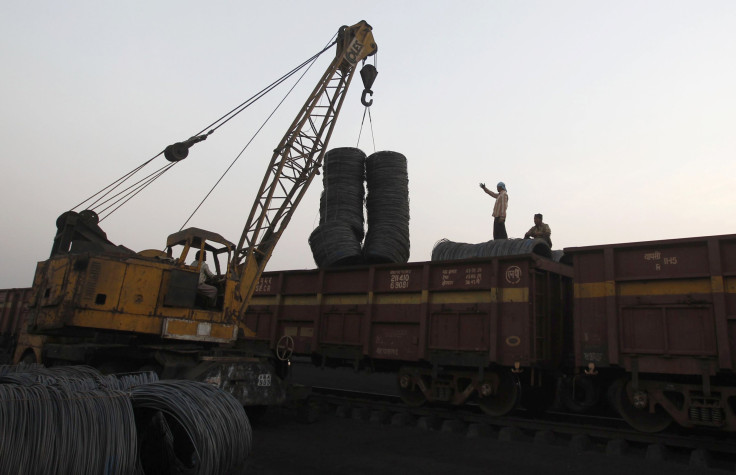Moody's Says Elections Won't Change India's Creditworthiness In The Near Term As Global Liquidity Trends Show Little Correlation To Election Results;

India is gearing up for nationwide elections later this year with debates and political advertisements on prime-time television sending out frequent reminders of the importance of the process to citizens, even as business and political leaders peer ahead with hopes of a better future once the nation elects a new federal government. However, the optimism does not seem to have left local shores.
On Tuesday, Moody's Investors Service said that even the emergence of a strong government in New Delhi will not bring any near-term positive changes to India’s creditworthiness.
"Firstly, growth trends over the past few decades show little direct correlation with election outcomes. Secondly, the influence of external conditions on Indian growth is underappreciated, and developed country growth and global liquidity trends will be crucial determinants," Rahul Ghosh, a senior research analyst and vice president at Moody's, said in a statement.
Moody's is not alone in its skepticism. In January, James Clapper, Director of U.S. National Intelligence, said: "Coalition politics will almost certainly dominate Indian governance. Since the 1984 national elections, no party has won a clear majority in the lower house of Parliament," he said, adding: "We judge that this trend will continue with the 2014 election, and the proliferation of political parties will further complicate political consensus building," the Press Trust of India reported at the time.
Currently, the Congress-led United Progressive Alliance, or UPA, is seen to have presided over a severe economic slowdown as India's once-promising growth prospects -- hampered by rampant corruption, slow reforms, crippling deficits and high inflation -- have dimmed considerably. In 2012-2013, India experienced a growth rate of 5 percent -- its slowest growth in a decade -- and Crisil, the local arm of Standard & Poor's, estimates that the economy grew at an even slower rate of 4.8 percent last year.
As a result, the Bharatiya Janata Party, or BJP, which is India's main opposition party, seems to have the upper hand. However, the Aam Aadmi Party, or AAP, an upstart political party led by a former bureaucrat that swept into power in New Delhi's state elections on an anti-corruption platform, threatens to further fragment the vote.
"If a coalition of smaller, regional parties without a common economic reform agenda were to take the helm, it would likely provoke further capital flight, thereby increasing borrowing costs and weakening the Indian rupee, and delaying economic recovery," Ghosh said in the release.
According to the Moody's report, even if the next party to come to power were to do so with the help of a clear majority, the need to keep smaller coalition allies on board would remain a key challenge to policy formation and implementation at a national level.
Meanwhile, Indian banks, which are struggling to tackle deteriorating asset quality, will have a tough time dealing with Indian companies and financial institutions that are coping with continuing economic weakness and tightening credit, which have also hurt consumer sentiment and domestic demand.
In a report from Standard & Poor's on Monday about the future of Indian banks in 2014, credit analyst Amit Pandey, said: "We expect weakness in banks' asset quality to persist for the next 12 months because the economic recovery is likely to be tepid, and it will take time for the domestic industry to recover and corporate balance sheet leverage to decline."
However, the country's central bank, the Reserve Bank of India, led by Raghuram Rajan, a former chief economist at the IMF, has taken some steps toward controlling inflation by raising key interest rates three times in the past six months. He has also leveled the playing field for foreign banks in November to help increase competition in the banking industry.
And, Rajan's efforts have been applauded by markets and investors. In January, assets under management in the Indian mutual fund industry increased by 9.4 percent, or $12.4 billion, to a record high of $150 billion. And, the benchmark BSE Sensex stock index has climbed by more than 8 percent in the last six months.
In January, a report from Moody’s had said that the BJP, led by its prime ministerial candidate, Narendra Modi, the chief minister of the western state of Gujarat, would lift the nation's mood and fortunes. Modi, who is extremely popular among Indian investors for his pro-business reformist agenda, however, is also an extremely polarizing figure for his alleged role in riots between Hindus and Muslims in his home state in 2002.
The U.S., which had snubbed him for the same reason by refusing him a travel visa in 2005, also seems to have softened its stance against him, and Nancy Powell, the U.S. ambassador to India, is reportedly planning to meet with him.
“We can confirm the appointment (between Mr. Modi and Ms. Powell),” a State Department spokesperson told PTI, without specifying an exact date. “This is part of our concerted outreach to senior political and business leaders which began in November to highlight the U.S.-India relationship,” the spokesperson added.
According to news reports, the decision for Powell to meet with Modi seems to have been a subject of immense debate within the White House and the State Department.
When asked about the visa issue, the State Department spokesperson reportedly told PTI: “There has been no change in our longstanding visa policy. When individuals apply for a US visa, their applications are reviewed in accordance with US law and policy. We do not speculate about outcomes of that process.”
Meanwhile, it remains to be seen if the world's largest democracy can rid itself of the challenges of policymaking with a fractured coalition government, by electing a clear leader at the top.
© Copyright IBTimes 2024. All rights reserved.





















